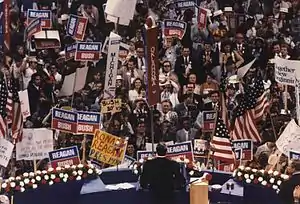
A convention bounce or convention bump refers to an increase in support that U.S. presidential candidates in the Republican or Democratic party typically enjoy after the televised national convention of their party.[1] A presumptive nominee for president may also be said to experience a "VP bounce" after announcing his or her pick for vice president prior to the convention. The size and impact of convention bumps vary, but presidential candidates usually see at least a small uptick in their polling numbers coming out of their conventions.[2]
History of convention bounces
1992
Bill Clinton benefited from one of the largest bumps in history after the Democratic National Convention in 1992, climbing by as many as 30 points in the polls, however this was assisted by Independent Ross Perot, who at the time was polling at 20%, withdrawing from the race during the Democratic convention.[3] Incumbent President George H. W. Bush's convention bounce was weak by comparison. Some party leaders blaming former primary challenger Pat Buchanan's fiery and divisive speech, which aired in primetime due to a scheduling delay.
2000
Al Gore's 2000 bounce endured for weeks. Prior to the Democratic convention, Gore was behind Texas Gov. George W. Bush by as many as 16 points,[4] but was in a statistical tie with the Republican the weekend after his acceptance speech.[4][5]
2004
Contrary to the beliefs of political pundits, Democratic candidate John Kerry did not get a convention bounce in 2004.[6]
2008
Polls indicated a small bounce for 2008 Democratic presidential nominee Barack Obama after his party's convention in August,[7] but as expected, much of it evaporated during and after the Republican convention the week following, yielding GOP candidate John McCain a small lead in several polls.[8][9] Nielsen ratings revealed that year's party conventions to be the most-watched ever, with the Republican convention narrowly trumping the Democrats'.[10]
2012
The RealClearPolitics polling index revealed the 2012 convention bounces for President Obama and GOP challenger Mitt Romney to be comparably smaller than in past elections.[11] Though Romney pulled even with Obama during that year's Republican convention at the end of August, Obama opened up a three- or four-point lead during the Democratic convention the week after.[11]
2016
In 2016, news sources and polls differed greatly on the size of the convention bounces received by Republican Donald Trump and Democrat Hillary Clinton after their respective conventions;[12][13][14][15] however, the RealClearPolitics polling index showed both candidates trending upward leading up to and after their acceptance speeches.[16] Clinton's bounce lasted somewhat longer than Trump's.[16]
2020
Democratic candidate Joe Biden, who held the lead over incumbent Republican Trump entering the Democratic convention, did not get a convention bounce,[17][18] with a CNBC-Change Research poll also indicating that the race had instead tightened in the swing states.[19] Republican candidate Donald Trump similarly did not receive a convention bounce after the Republican convention[20][21] with a CNN poll indicating that the race remained unchanged after both conventions.[22]
References
- ↑ "U.S. Elections Glossary & Terms". All American Patriots. September 2004. Archived from the original on 2008-12-01. Retrieved 2009-06-20.
- ↑ Tom Holbrook: Convention Bumps
- ↑ AP: Post-convention bounce averages 10 points Archived September 2, 2008, at the Wayback Machine
- 1 2 Gore Gets Convention Bounce, but Will Fickle Figures Last?. New York Times. 2000-08-23.
- ↑ Convention Bounce Gives Gore 5-Point Lead. ABC News. 2000-08-21.
- ↑ CBS News: No Bounce for Kerry
- ↑ Politico: Obama's bounce smaller than others
- ↑ Gallup: McCain’s Bounce Gives Him 5-Point Lead
- ↑ USA Today Poll: Convention lifts McCain over Obama
- ↑ Associated Press: McCain, Obama tied in TV audiences
- 1 2 General Election: Romney vs. Obama. RealClearPolitics. Retrieved 2012-10-08.
- ↑ Agiesta, Jennifer (July 25, 2016). "Donald Trump bounces into the lead". CNN. Retrieved July 25, 2016.
- ↑ Hartig, Hannah. "Poll: No Post-Convention Bounce for Donald Trump". NBC. Retrieved 1 August 2016.
- ↑ Rappeport, Alan (1 August 2016). "New Poll Reflects a Post-Convention Bounce for Hillary Clinton". The New York Times. Retrieved 1 August 2016.
- ↑ "CNN/ORC Poll" (PDF). CNN. 1 August 2016. Retrieved 2 August 2016.
- 1 2 General Election: Trump vs. Clinton. RealClearPolitics. Retrieved 2019-02-05.
- ↑ Shepard, Steven (August 24, 2020). "Poll: No convention bounce for Biden, who maintains big lead over Trump". Politico. Retrieved August 27, 2020.
- ↑ Kahn, Chris (August 26, 2020). "Biden gets no convention bounce after Democratic gathering: Reuters/Ipsos poll". Reuters. Retrieved August 27, 2020.
- ↑ Pramuk, Jacob (August 26, 2020). "Coronavirus concerns fall and Trump approval ticks higher in swing states, CNBC/Change Research poll finds". CNBC. Retrieved August 27, 2020.
- ↑ Editor-at-large, Analysis by Chris Cillizza, CNN (3 September 2020). "Analysis: It's official: There's no Trump bounce out of the conventions". CNN. Retrieved 2020-09-03.
{{cite web}}:|last=has generic name (help)CS1 maint: multiple names: authors list (link) - ↑ Peters, Cameron (2020-08-30). "Poll: Biden's approval rating got a convention bounce. Trump's didn't". Vox. Retrieved 2020-09-03.
- ↑ "CNN / SSRS Poll (2020-09-02)" (PDF).